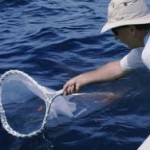 Big recyclers and important for carbon storage: New evidence explores how important this large mammal is for regulating nutrients in the sea.
Big recyclers and important for carbon storage: New evidence explores how important this large mammal is for regulating nutrients in the sea.
What does whale excrement, or poop, have to do with enriching the world’s marine environment? Plenty, according to a recent article on Greenbang. The “poop” the article is referring to is that contributed by whales whose diet is largely consisting of ingesting thousands of pounds of a small marine crustacean known as krill. Krill are small, shrimp-like creatures whose average size is that of a paper clip, and are full of iron that they obtains from the sea; especially from feeding on algae in many of the world’s oceans. Their poop, also, helps our oceans absorb the greenhouse gas carbon dioxide from the atmosphere. Now’s a better time than ever to Save the Whales!Whales that feed on krill include the world’s largest living mammals: the majestic blue whale; which are not only found in the northern and southern oceans, but in locations such as the Gulf of Eden in Yemen, and in parts of the Persian Gulf.
Since algae is one of the world’s best sources of carbon, the whales ingest a certain amount of carbon and iron from the large amounts of krill they eat. The amounts of krill ingested amount to thousands of tons a year by producing a large amount of excrement, containing as much as 12 per cent iron.
Collecting whale poop for study
Of course, whales are not the only large marine mammals found in sea, including bodies of water like the Gulf. At least 4,000 dugongs (large gentle marine herbivores, related to the manatee of sea cow) also live in the Gulf, as well as 40 different species of dolphins.
In a recent Green Prophet article , I expressed environmental concerns for the well being of the Gulf’s dugong population that in some parts of world is threatened with extinction.
The fact that whales, a very much endangered species, make so much of a contribution to fertilizing the sea, it would seem that more of an effort should be made to save them from the harpoons of whalers, as well as from environmental dangers like oil and chemical spills, ingestion of plastics and other waste materials, mercury and other metals poisoning; and global warming, which has an effect on the very food the whales like to eat.
Steve Nicol, a scientist for Australia’s Antarctic Division, estimates that whales are responsible for “recycling” more than 12% of the iron found in the Southern Ocean alone. And this iron comes largely from krill which hold large quantities of iron in their bodies.
As noted by Nicol: “Approximately 24 per cent of the total iron in the Southern Ocean surface water is currently stored within krill body tissue.”
This works out to an estimated 379 million tons of krill in the Southern Ocean alone that includes an iron supply of about 15,000 tons.
Since blue whales are frequently sighted in both the Gulf of Aden and the Persian Gulf, it means that the poop they generate is helping to fertilize and increase the iron content of these bodies or water. Other marine mammals, fish and birds also feed on krill, including albatross, pelicans, cormorants, and species of seals and sea lions.
Naturally, the future of large sea mammals like whales depends heavily on ample supplies of krill. These magnificent animals have few natural enemies, outside of predators such as killer whales (Orcinus Orca) which are actually members of the dolphin family This only leaves one earth mammal that is now the greatest threat to the future of the whale population – and the quantities of iron-rich excrement they produce. And that mammal is non-other than Man.
Image via www.divematfrix.com
::Greenbang
Read more on benefits of poop and algae:
Qteros Makes Bio Fuel from Animal and Human Excrement.
Expanding the Role of Algae for Food and Other Products
Algae Into Bio Fuel in Joint Israel-Chinese Project





Do you by chance know what kind of whale that is in the photo?
Thank you!